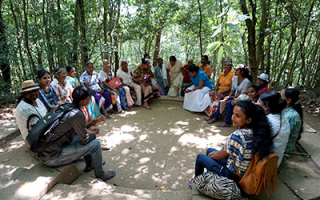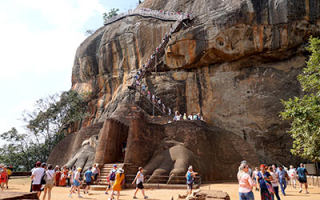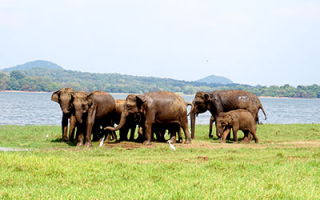Asian Regional Course on People-Nature-Culture 2019
Asian Regional Course on Promoting People-Centred Approaches to Conservation of Nature and Culture (PNC19)
Organizers: ICCROM, IUCN, Sri Lankan Department of Archaeology, Sri Lankan Central Cultural Fund
Partners: Cultural Heritage Administration of Korea, Norwegian Ministry of Climate and Environment in collaboration with ICOMOS, UNESCO World Heritage Centre
Call for participants: do you work with communities and heritage places?
We are seeking 20 participants to take part in an Asian regional course on Promoting People-Centred Approaches to Conservation of Nature and Culture. The course is open to:
- Heritage practitioners from the cultural and natural heritage sectors, whether working in a specific heritage place or at a regional or national level.
- Individuals involved in the conservation and management of cultural and natural heritage e.g. policy-makers and other representatives of institutions, non-governmental organizations, charities, local associations, community groups, researchers etc.
- Individuals working with community groups who use heritage to bring benefits to society and/or heritage.
Participants should be able to demonstrate their involvement in ongoing activities with diverse communities and entities within the context of management activities at a heritage place with natural and cultural values. Importance will be placed on selecting some participants who deal with World Heritage properties and/or are active in capacity building initiatives to improve approaches to heritage conservation and management.
Knowledge acquisition and exchange will be promoted through the course format, which is framed as a forum for participants from both the cultural and natural heritage sectors to share their experiences, learning from each other and from resource persons working with communities and heritage. The course will consist of interactive sessions sharing experiences, lectures, case study visits and practical exercises based on case studies in the field.
The working language of the course will be English.
Course concept
The People, Nature, Culture course aims at contributing towards the new paradigm shift ‘from the care of heritage to that of pursuing the wellbeing of both heritage (natural and cultural) and society as a whole’. The goal is to strengthen understanding of people and communities as a core component of heritage management among those involved in heritage management, thus ensuring that natural and cultural heritage have a dynamic and mutually beneficial role in society today and long into the future. This stems from an increasing recognition that heritage places are cared for, used and enjoyed by a vast array of people. Contributions to management, conservation and use of a heritage place come from a variety of sources, but primarily from heritage-sector practitioners, policy-makers within institutions, and representatives of communities and networks. Working with all these groups can be essential for ensuring that benefits are gained for society and for the heritage itself.
Another objective is to approach natural and cultural heritage conservation as an interrelated and interdependent concept. The course aims to provide support to promote quality management at World Heritage properties and other heritage places through understanding the existing heritage management systems that were built up as separate domains. There is increasing awareness that natural attributes contribute to resilience of cultural heritage, but also that threats to natural attributes contribute to increased threats to culture, and vice versa. It is important for all relevant players to be aware of different attributes and values that build up the heritage place, and collaborate in using different approaches and methods to identify and protect diverse values holistically.
Engaging people is still a real challenge at many heritage places. Linking nature and culture also has its realistic barriers, as institutional and legal protection systems have often been built up separately. While there is no simple recipe, there are many examples that can be explored to understand the range of possible approaches and to inspire adaption of approaches elsewhere. There is also a variety of frameworks, tools and methodologies developed which can be utilized to ensure effective management and good governance, while both addressing potential threats and harnessing opportunities for increased benefits. This course aims to bring those involved in heritage management and conservation together to share their experiences and learn from others in order to advance practice in the field.
Course goals and the course in context: The World Heritage Leadership Programme
This course aims to provide participants with knowledge, skills and awareness necessary for working with diverse people and values in managing heritage places, including World Heritage, but also promote long-term networks for life-long peer learning and enhanced capacity building in the heritage sector. Moreover, the outcomes of this course, along with other World Heritage Leadership Programme initiatives, should contribute to consolidating people-centred approaches and nature-culture linkages throughout World Heritage processes. World Heritage has the potential to be a catalyst for improvements to institutional and legal frameworks in many State Parties with positive repercussions for heritage in general.
The World Heritage Leadership Programme is a capacity-building programme delivered by IUCN and ICCROM in collaboration with ICOMOS and WHC and other organizations, and is being developed with the support of the Norwegian Ministry of Climate and Environment and other partners. It focuses on promoting links between people-nature-culture in the management of heritage places, and securing for heritage a more dynamic role in wider sustainable development.
Proposed Venue and the Activities
The proposed venue of Dambulla is located in the central part of Sri Lanka. Dambulla is surrounded by a large number of cultural and natural heritage assets, and is located in the epicentre of the ancient irrigation civilization of Sri Lanka that started from 6 BCE with a large number of human-made reservoirs (artificial tanks) still functioning to sustain thousands of hectares of rice terraces. Among them are the cultural World Heritage sites of Golden Temple of Dambulla, Ancient City of Sigiriya and one component of the Central Highlands natural World Heritage site. An elephant sanctuary, a number of strict nature reserves, several major cultural heritage sites and the Minneriya reservoir are also located in the vicinity, which are also part of the GIAHS (Globally Important Agricultural Heritage System) designation. Agriculture is the main source of income for the local people, although tourism is slowly growing in the area. The government of Sri Lanka has plans to develop Dambulla as an Economic Hub with a view to improve the livelihood of the people. As a case study of the course and with the support of the local counterparts, participants will have the opportunity to explore culture, nature and people linkages and how to address all pillars of Sustainable Development, not just the Economic pillar, in this unique agro-eco-cultural region. This is also an opportunity to explore how heritage both natural and cultural can underpin the improvement of the livelihood of people by placing them at the heart of heritage conservation discourses.
Travel, accommodation and living expenses
Participants will be responsible for their round-trip travel costs to and from Colombo, Sri Lanka (accommodation and living costs will be provided). Candidates are strongly encouraged to seek financial support from sources such as governmental institutions, employers and funding agencies, and inform ICCROM of any funding secured or in the process of application. In cases of proven financial need, and depending on the availability of funding from external sources at the time of the course, a limited number of partial scholarships may be granted to cover travel expenses.
Applications
Please fill the ICCROM application form and send it together with a full professional curriculum vitae (in English and maximum 3 pages) to the following e-mail: PNC19 (at) iccrom.org.
Although this is primarily an Asian Regional Course, a small number of slots are reserved for international participants. Therefore everybody is eligible to apply.
Application deadline
Applications should reach ICCROM by 30 August 2019 to ensure inclusion in our selection process.






